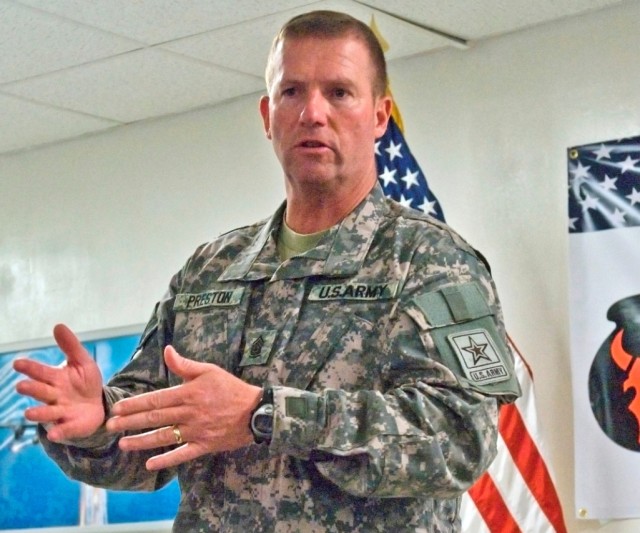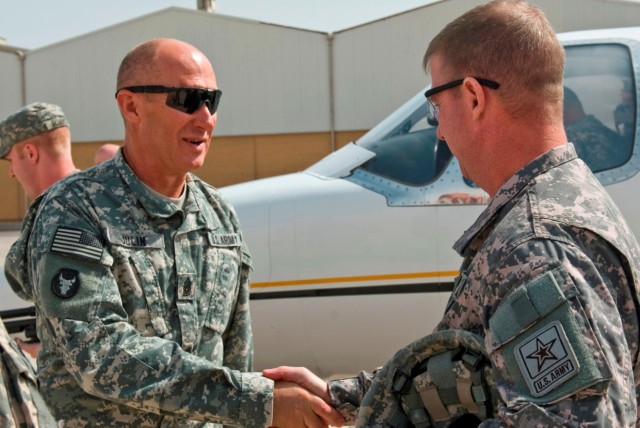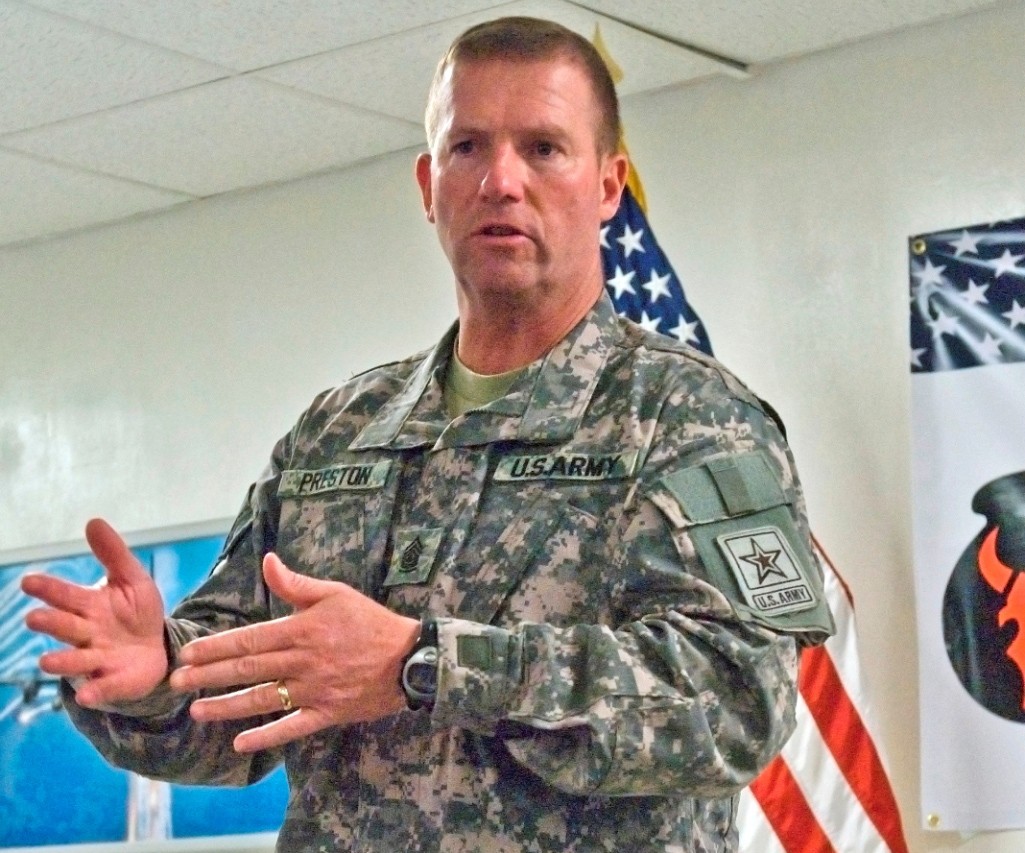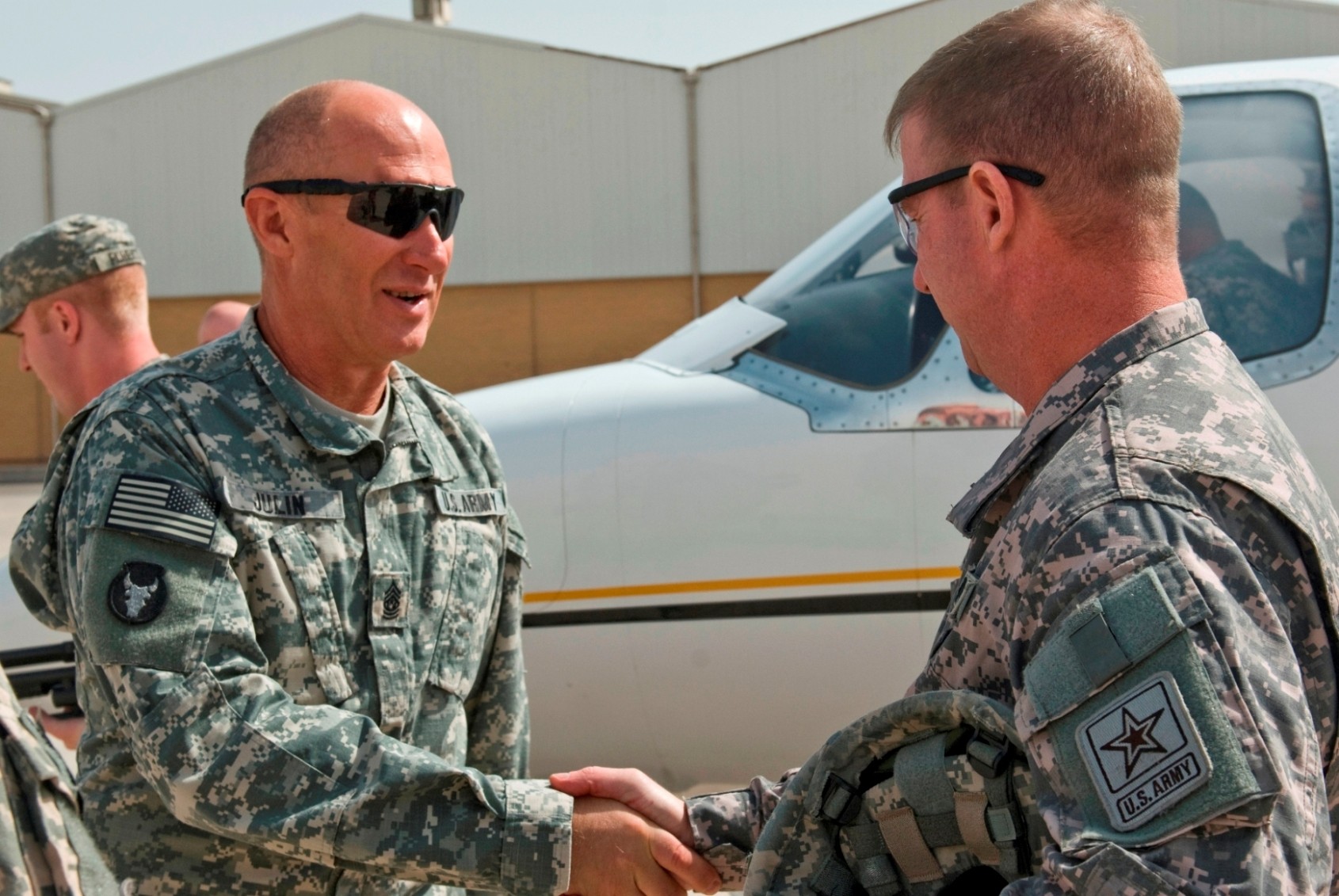COB BASRA, Iraq (Aug. 10, 2009) -- Sgt. Maj. of the Army Kenneth O. Preston told troops at Contingency Operating Base Basra Aug. 4 that his top three topics were stress, recruiting and retention, and the Year of the Noncommissioned Officer.
Preston talked with Soldiers about the stress both deployed and stateside Soldiers deal with.
"We watched suicides increase over the last four years," said Preston. "I worry about that. It keeps me up at night. And the way I look at it: It's stress."
"I told the president that when you're over there it's seven days a week and long hours," said Preston to the assembled junior-enlisted Soldiers. "Somewhere in there, you get 15 days of leave and then you're back at it again."
Preston explained that he and the senior-enlisted advisors from other services met with President Barack Obama earlier this year and were asked to submit their top three to five issues.
Preston said he tried to explain to the president what life is like as an enlisted Soldier, touching on topics such as dwell times and how extended deployments were necessitated by the number of brigade combat teams in Iraq at the time of the surge.
Preston spoke of the institutional culture of stress placed upon Soldiers both deployed and not deployed, citing drill sergeants, Army instructors and recruiters as Soldiers under more stress than commonly thought.
In addition, Preston spoke of the deployment stress endured by the families and Army units left behind, as well as economic stresses caused by the global recession.
"If you have to move every two or three years with your unit, then you may end up in situations where the balance of your mortgage exceeds the value of your home," Preston said. "Then you end up with geographic bachelors, where the Soldier goes ahead and the families stay behind, which causes more problems."
Preston also discussed recruiting and retention. He said recruiting and retention numbers are strong and are an affirmation of the Army way of life.
"Soldiers and families," Preston said, "would not continue to re-enlist and continue to stay if they didn't believe in what they were doing, didn't want to continue to be part of something bigger than themselves and didn't want to continue to be part of that band of brothers."
Preston finished by talking about the Year of the NCO, a campaign to highlight the contributions of NCOs, who he called "the backbone of the Army" and the people who in fact "run the Army, allowing the officers to focus on long-term goals."
Before opening the floor to questions from the junior-enlisted Soldiers, Preston thanked them for aspiring to be Soldiers and then told them he wanted them "to aspire now to be an NCO."
"We want to grow sergeants," Preston said. "All of you have the potential to be a sergeant."
The potential sergeants asked Preston about topics like promotions and the mission in Iraq and Afghanistan. Preston did his best to answer each question before he left to tour COB Basra.
In addition to the luncheon, Preston talked with Command Sgt. Maj. Doug Julin, senior-enlisted advisor for the 34th Infantry Division, Minnesota National Guard and Multi-National Division-South. Preston also participated in an open town hall meeting.
The junior-enlisted Soldiers, most of whom have spent fewer years living than Preston has spent in the Army, later said the meeting was a worthwhile experience.
Spc. Shane Gunlock, a Farmington, Minn. native and clerk for the 34th Inf. Div. computer helpdesk, said he appreciated the opportunity to pose questions to "someone who for sure knows the answer."
Pfc. Angelica Medrano, a 34th Inf. Div. administrative specialist, said "to meet the sergeant major of the Army, and I'm a private, is just cool, just meeting someone high up there."
Spc. Charles Bryant, a Brooklyn, N.Y. native and a truck driver with 2nd Brigade Combat Team, 4th Inf. Div., said "on my level we don't get many opportunities to hear the big decisions that get made at the top. I believe it was great that he would come down and kind of clarify some things for us."
"As a Soldier, outside the wire, you never really feel that anyone cares about you or the stress you're in besides your immediate leadership," said Bryant, "To know that someone at that high of level is taking consideration of your level of stress ... is comforting."




Social Sharing